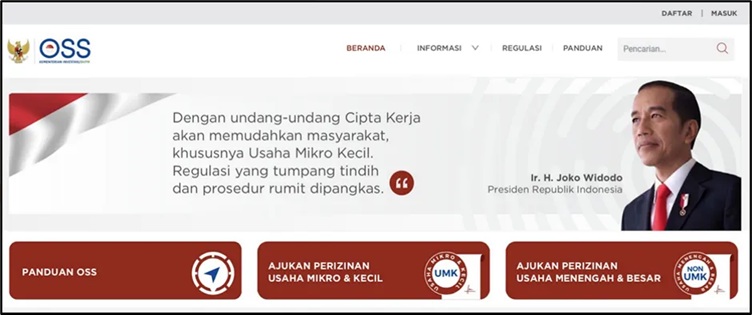In this era of digitalization and easy access to information, the Indonesian government has developed a more efficient business licensing system through the Online Single Submission (OSS) platform. One of the main elements of this system is the Business Identification Number (Nomor Induk Berusaha or NIB), which serves as the official identity for business actors. NIB is not only an administrative requirement, but also offers numerous benefits, including access to financing and legal protection. However, many business owners still lack understanding of its importance and the registration procedures.
SIP Law Firm will provide a deeper look into the NIB and simple steps to obtain it!
Definition and Legal Basis of Business Identification Number (NIB)
A Business Identification Number (NIB) is an identity issued by the OSS Agency once a business registers its operations. NIB serves as an official identity in various business processes, including permit applications, business loan requests, tax compliance, and import-export activities. In the OSS system, the NIB automatically functions as a Company Registration Certificate (TDP), Importer Identification Number (API), and provides customs access where applicable.
This is governed under Article 87 of Law No. 6 of 2023, which stipulates the enactment of Government Regulation in Lieu of Law No. 2 of 2022 on Job Creation as Law (“Job Creation Law”), amending Article 91 paragraphs (1) to (4) of Law No. 20 of 2008 on Micro, Small, and Medium Enterprises. The law mandates:
(1) Central and regional governments must facilitate business licensing for micro and small enterprises in accordance with norms, standards, procedures, and criteria set by the central government.
(2) Registration can be done online or offline by submitting an ID card (KTP).
(3) Online registration will result in the issuance of a NIB through the OSS system.
(4) The NIB acts as a single license valid for all business activities.
Further, Government Regulation No. 28 of 2025 on Risk-Based Business Licensing (“GR 28/2025”) provides additional clarity. Article 1 point 12 defines NIB as proof of registration for business actors to conduct their activities and as an official business identity. Article 234(2) states that for low-risk micro and small enterprises (MSEs), the NIB also serves as:
a. A declaration of compliance with Indonesian National Standards (SNI); and/or
b. A halal assurance statement, pursuant to the relevant laws and regulations.
How to Obtain an NIB via the OSS System
Obtaining a NIB has now become more accessible through the OSS system developed by the Ministry of Investment/BKPM. Article 1 point 21 defines the OSS system as an integrated electronic system managed by the OSS Agency for the purpose of risk-based business licensing. Here are the key steps:
- Prepare Business Documents and Information
Before starting the process, business actors should prepare:
(a) National Identity Number (NIK) for individuals or deed of establishment and Taxpayer Identification Number (NPWP) for entities.
(b) Business plan and location.
(c) Contact details (active email and phone number).
(d) Supporting documents (location permit, domicile letter, if required).
- Access and Register on the OSS Platform
(a) Visit the official OSS website: https://oss.go.id
(b) Click “Register,” select the type of business (individual or entity), and complete the registration form.
(c) An activation link will be sent to your email upon successful registration.
- Log In and Fill in Business Information
(a) Log in using your registered account.
(b) Go to “Business Licensing” > “New Application.”
(c) Complete your business profile, activity details, business classification (KBLI), and operational plan.
- Verification and Issuance of NIB
(a) Once submitted, the system will automatically validate the data.
(b) The NIB and, if required, the Business Standard Certificate will be issued electronically.
(c) The documents can be downloaded and stored as part of your business legality documents.
Why Is NIB Important for Business Owners?
Operating without an NIB can lead to several challenges and risks, including:
- Limited access to funding: Banks and financial institutions generally require NIB for credit or financing applications.
- Ineligibility for government tenders: Many government and state-owned enterprise projects mandate legal business status through NIB.
- Administrative sanctions: Businesses without NIB may face warnings, penalties, or temporary closure by the authorities.
- Reduced collaboration opportunities: Large corporations usually only partner with businesses that have proper legal documentation.
- Ineligibility for support programs: Numerous government and private mentoring or partnership programs are only available to businesses with an NIB.
The Business Identification Number (NIB) is a crucial component of legal business operations in Indonesia. Holding a valid NIB allows entrepreneurs to operate legally, access funding opportunities, and enjoy legal protection. On the other hand, not having an NIB may result in administrative and legal setbacks. Therefore, all business actors are strongly encouraged to register their businesses through the OSS system to ensure secure and sustainable operations.***
Daftar Hukum:
- Undang-Undang Nomor 6 Tahun 2023 tentang Penetapan Peraturan Pemerintah Pengganti Undang-Undang Nomor 2 Tahun 2022 tentang Cipta Kerja Menjadi Undang-Undang (“UU Ciptaker”).
- Peraturan Pemerintah Nomor 28 Tahun 2025 tentang Penyelenggaraan Perizinan Berusaha Berbasis Risiko (“PP 28/2025”).
Referensi:
- Cara Daftar Nomor Induk Berusaha (NIB) Untuk Orang Perseorangan, Panduan Lengkap dengan Gambar. UMKM Indonesia. (Diakses pada 15 Juni 2025 pukul 13.46 WIB)
- Adakah Sanksi Jika Tidak Memiliki NIB?. HukumOnline. (Diakses pada 15 Juni 2025 pukul 13.48 WIB)
